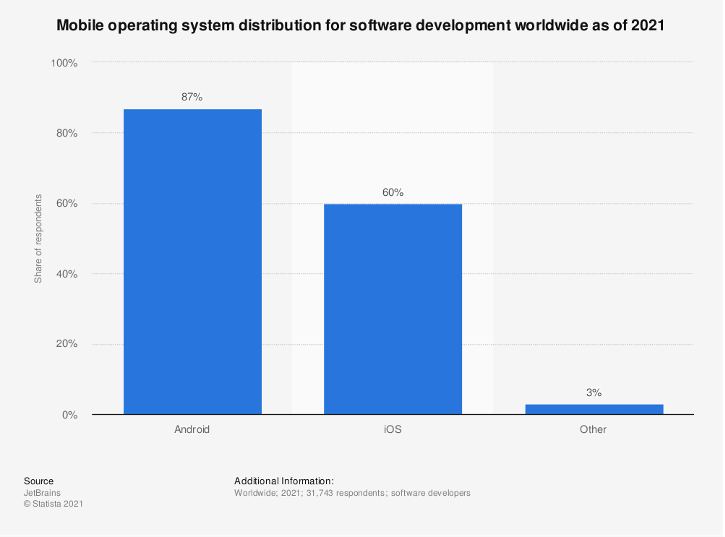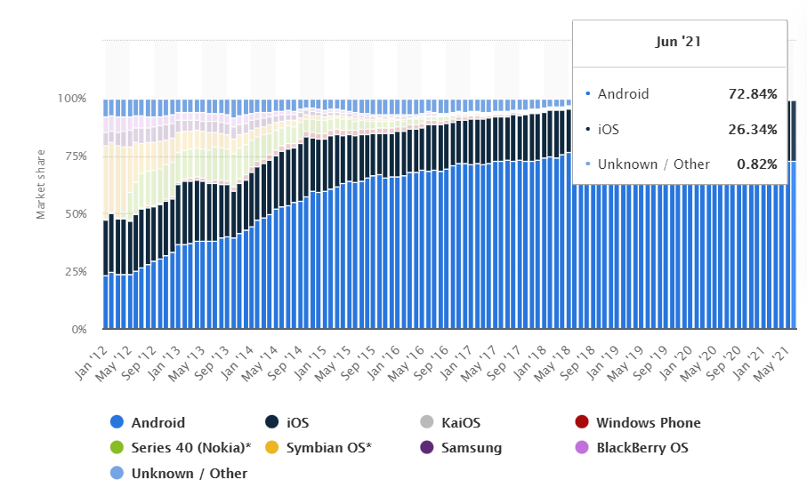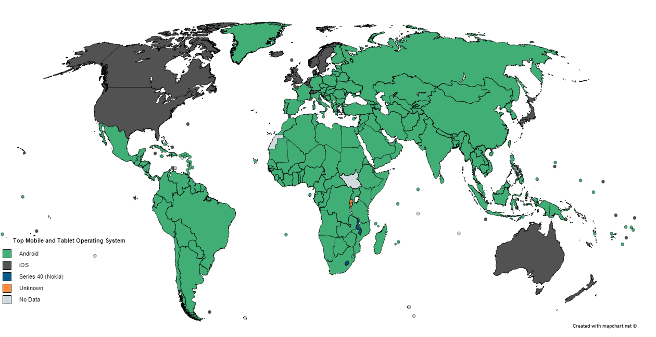The mobile industry is essentially split between Apple’s iOS and Google’s Android.
A global software developer survey showed that as of 2021, 87 percent of mobile software developers work on Android OS, followed by Apple’s iOS with 60 percent.

The global mobile app development market is projected to reach USD407.31 billion by 2026.
Therefore, the iOS-Android duopoly simply means that whether you’re looking for iOS Developer jobs or Android developer jobs, you will find a sizable percentage of high-paying mobile development jobs for either or both these skills.
However, iOS vs. Android is an age-old debate, and if you’re new to the mobile industry, you’re probably wondering which platform to focus on. While there is no easy answer to this question, let’s understand the technicalities and the market for both these systems to make an informed decision.
Pros and Cons of Android
Contents
Here are the main pros of Android Development:
1. Global market share domination & worldwide audience
Android is the leading mobile operating system with nearly 73 percent market share.

Additionally, this Android vs. iOS world map will tell you that if you’re looking to target a global audience, Android is your best bet.

With businesses all over the world targeting such a broad market, you can find high-paying android developer jobs if you have the skill and experience.
2. Flexibility
iOS developers and Android developers have varied engineering opportunities.
Some mobile software developers prefer Android over iOS because of its less restrictive developer environment. Android is open-source software; therefore, android developers can take advantage of crowd-created plugins and frameworks. They can modify and redistribute the code after customizing the features and functionalities endlessly.
These apps can run on virtually any Android device without facing any significant issues with hardware compatibility.
Additionally, Android developers can develop applications using Java, which means they can work on any OS as long as it supports the programming language.
3. Learning Resources
Google provides extensive training programs with interactive exercises for beginners. Furthermore, there are several free online courses available for android developers with different levels of expertise.
4. Publishing your App
It is relatively easy to get approval for publishing your android app. While the review process may take up to a week for new android developers to gain approval, most android apps don’t violate the company’s policies and get approved without any fuss.
Additionally, Google charges a reasonably low one-time registration fee of USD25 to maintain the quality of software products.
Cons of Android Development.
1. User Preference
Because of the low entry margin, tons of applications are available for android users to choose from. Therefore, users tend to prefer free applications and are less likely to spend much on in-app purchases.
Therefore, while there may be a ton of Android Developer jobs available, you may need to dig a little deeper to find opportunities that pay well.
2. User Experience
While there are just around 30 iOS gadgets, there are over 24,000 Android devices in the market. This number makes it impossible to predict how the UI will alter the user experience for users on a sparse Android device or gadget.
Therefore, if you don’t take particular care about your UI and UX, you stand a chance to lose a part of your target audience.
3. OS Update
A significant number of android users fail to update the OS version on their device. This means android developers need to deal with devices with different capabilities and software algorithms.
This scenario makes it difficult for developers to create a software product without losing a section of their audience who use old devices.
4. Cost
Given the fragmentation of Android users, skilled developers and designers are required to keep up with all the requirements. Therefore, building an android application is expensive and time-consuming.
5. Quality Assurance
While the fragmentation allows Android developers to target their audience with granularity, it makes testing your product extremely complicated. This compromises the quality of the product since developers are required to fix issues that arise for different levels simultaneously.
6. Higher Vulnerability
Android is an open license platform; therefore, it has a higher probability of falling victim to cyberattacks when compared to iOS.
Pros and Cons of iOS
Here are the main pros of iOS Development:
1. Faster and Less Expensive Development
Given iOS’s exclusivity to Apple, developers simply need to adhere to Apple’s guidelines to build an app. Additionally, the limited Apple devices allow developers to develop and test their products for fewer parameters.
Android developers need to learn Java, which is a complicated language. On the other hand, Apple uses Swift programming language, which is comparatively less complex than Java.
2. Performance & Cpabilities
iOS applications have a reputation for excellent performance. The platform is easy-to-use, fast, reliable, and doesn’t publish apps that have significant bugs in the final stage.
An iOS application is also more responsive than an Android application.
3. Higher Security
iOS is considered to be one of the most secure mobile development platforms. All iOS apps are protected from piracy by default.
From financial apps to apps for your clients, you can take advantage of iOS’s several security features to build a secure mobile application.
4. Sleek UI/UX
Apple has a detailed guideline that developers need to follow when it comes to the UI for their apps. While this may seem like a limitation to most developers, this is how Apple ensures that all its applications provide an exceptional user experience.
5. Financially Lucrative Market
Apple users are more willing to purchase an app or spend money on exclusive features than Android users. Therefore, in terms of direct sales revenue, iOS dominated the market.
6. Target First-World Countries
With iOS app development, you have the ability to target developed countries like Western Europe and North America. This means you’ll have better monetization opportunities.
Disadvantages of iOS development:
1. High Level of Restrictions
Customization of iOS apps is difficult since Apple has many restrictive guidelines and a limited development toolset.
While it is beneficial for an iOS developer with limited resources to use the ready frameworks and functional & interface models to build their app, most of these frameworks need to be purchased.
2. Inflexible Development Environment Requirements
For native iOS app development, developers need to work with software programs that only run on Mac. For example, XCode.
If you want to build an iOS app, you need to own at least one Apple device.
3. App Store Rules & Regulations
While it usually takes around five days for an iOS app to get approved, there is a probability that your product may not pass Apple’s standards.
If Apple rejects your app, then the only thing you can do is rebuild it.
Bottom Line
While there may not be a clear answer to which mobile development system is the winner, both have their own perks. But one thing that you can’t dispute is the fact that both of them dominate the market and appeal to a widely different set of audiences.
Depending on your priorities, you can find excellent opportunities as a skilled developer since these technologies are in high demand.
Whether you’re a mobile developer looking for remote iOS Developer Jobs or Android Developer Jobs, Turing has extensive opportunities for you to work remotely with reputed US-based companies.
After you pass Turing’s vetting process, you will be seamlessly matched with a US company actively looking for a mobile developer with your qualifications. Additionally, should the contract be terminated after a predetermined period, Turing will match you with another organization, so you don’t ever have to look for another job again.
Are you an organization looking to hire developers instead? Well, with Turing, you can choose from the top 1% from a talent pool of 700,00K+ skilled, pre-vetted software developers with excellent technical and communication skills. The best part? There’s no risk. Turing offers a free two-week trial period to ensure that the developers deliver to your standard.


